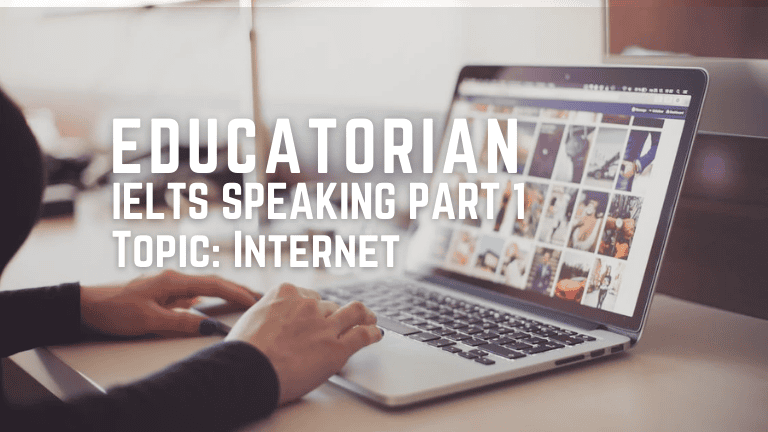
IELTS Speaking Part 1 – Internet
IELTS Speaking Part 1 (Internet)
Topic: Internet
Difficulty: Easy
IELTS Speaking Part 1 – Internet
- What would you do without the internet?
- Do you think you spend too much time online?
- How does the internet influence people?
- How often do you go online?
- When did you start using the internet?
What would you do without the internet?
Aya (High School Student)
Without the internet, I think my life would be quite different. I rely on it for schoolwork and communication with friends. If I had no internet, I would probably read more books or spend time drawing. I might also play more outdoor games, like soccer or badminton. I could join clubs at school to meet new friends. However, I would miss connecting with friends through social media and watching anime online. I think it would be a big change for me. I believe I would need to find new ways to stay in touch with my classmates and learn about the world. I hope that I could adapt to life without the internet, but it would certainly be challenging!
Minho (University Student)
Without the internet, I would struggle to keep up with my university studies. I often rely on online resources for research and connecting with classmates. If I did not have the internet, I would spend more time in the library, searching for books and articles. I might also focus more on face-to-face interactions, which could help me build stronger relationships with friends. However, I think I would miss the convenience of online learning and the ability to access information quickly. Overall, I would need to adapt my study habits and find new ways to communicate with others. While I can imagine managing without the internet, I believe it would be a significant adjustment for me.
Linh (Office Worker)
Without the internet, my work life would change drastically. I depend on it for communication with clients and team members. If I had no internet, I would spend more time using traditional methods, like phone calls or in-person meetings. I might also focus more on physical documents instead of digital files. However, I think I would miss the convenience of accessing information quickly and staying updated on industry trends. My productivity might decrease, and it could become challenging to collaborate with my colleagues. While I could manage, I believe that my work would be less efficient without the internet, and I would have to find creative solutions to stay connected.
Mr. Wong (Retired English Teacher)
Without the internet, I would have to rely on traditional media for information and communication. I often use the internet to connect with former students and stay updated on educational trends. If I could not access the internet, I would probably read more books and newspapers, which I still enjoy. I think my social life would be less connected, as I often communicate with friends through email or messaging apps. However, I believe I could still engage in meaningful conversations through phone calls or in-person gatherings. While I appreciate the convenience of the internet, I also value the slower pace of traditional communication methods. I would adapt, but it would certainly require some adjustment.
Do you think you spend too much time online?
Aya (High School Student)
Yes, I think I spend too much time online. I often find myself scrolling through social media or watching videos for hours. Sometimes, I lose track of time while browsing, and then I realize I should be doing homework or studying. I enjoy connecting with friends and learning about new things, but I know I should balance my online time better. I want to spend more time outdoors or reading books. My parents often remind me to limit my screen time, and I understand their concerns. I plan to set specific times for using the internet, so I can focus on other important activities in my life.
Minho (University Student)
Yes, I do feel that I spend too much time online. As a university student, I often find myself on the internet for studying, researching, and socializing. While it is essential for my education, I sometimes get distracted by social media or gaming. I believe I should manage my time better to focus on my studies and personal growth. Sometimes, I even check my phone during lectures, which is not good. I want to improve my time management skills to create a healthier balance between online and offline activities. I think reducing my screen time could help me be more productive and present in my daily life.
Linh (Office Worker)
I think I spend a considerable amount of time online, especially for work-related tasks. While it is necessary for my job, I sometimes find it hard to disconnect after work hours. I often check emails or browse the internet even when I am home. This habit can lead to burnout, so I try to set boundaries. I aim to spend my evenings engaging in hobbies or spending time with family instead of staring at a screen. While I value the internet for its convenience, I also understand the importance of balance. I believe finding time for offline activities is essential for my well-being.
Mr. Wong (Retired English Teacher)
I do not think I spend too much time online, but I use it regularly for various purposes. I enjoy reading articles, connecting with friends, and exploring educational resources. However, I also make time for other activities, like reading books and enjoying nature. I believe it is important to maintain a healthy balance between online and offline life. I value the knowledge I gain from the internet but also appreciate the slower pace of traditional methods. I try to engage in meaningful conversations with friends and family outside the digital world. This balance keeps my mind active and allows me to enjoy different aspects of life.
How does the internet influence people?
Aya (High School Student)
The internet influences people in many ways. For my generation, it shapes how we communicate and learn. Social media platforms help us connect with friends and share our thoughts. However, I think it can also create pressure to present a perfect image online. Some people compare themselves to others, which can affect their self-esteem. The internet also provides access to information, helping us learn about different cultures and ideas. I believe that while the internet can be a powerful tool for learning, it is important to be mindful of how it affects our emotions and relationships. We must use it wisely and not let it take over our lives.
Minho (University Student)
The internet has a significant influence on people today. It shapes how we access information, communicate, and even form opinions. With so much information available online, it becomes easier to stay informed about various topics. However, this can also lead to misinformation and confusion. Social media platforms allow us to connect with others worldwide, promoting understanding and collaboration. On the other hand, it can create echo chambers where people only hear opinions that match their own. I think it is crucial for individuals to critically evaluate the information they consume and engage in discussions that challenge their viewpoints. The internet can be a powerful tool for change if used wisely.
Linh (Office Worker)
The internet greatly influences people, especially in the professional world. It allows for instant communication, collaboration, and access to vast amounts of information. In my job, I rely on online resources to stay updated on market trends and connect with clients. However, this constant connectivity can also lead to information overload and stress. People may find it challenging to disconnect from work or personal obligations. I believe it is essential for individuals to find balance and set boundaries regarding internet use. While it is a powerful tool for growth and learning, it is important to recognize its potential downsides and make conscious choices about how we engage with it.
Mr. Wong (Retired English Teacher)
The internet influences people in profound ways. It has transformed how we access information, communicate, and engage with the world. I see it as a double-edged sword; it provides opportunities for learning and connection, but it also poses challenges like misinformation and superficial interactions. The vast amount of information available can help people expand their knowledge, but it can also lead to confusion if not critically evaluated. I encourage my friends to engage with online resources thoughtfully and be aware of the potential pitfalls. While the internet can enhance learning and communication, we must use it responsibly to foster genuine connections and understanding.
How often do you go online?
Aya (High School Student)
I go online every day, usually multiple times. I check my social media accounts in the morning and during breaks at school. I often browse the internet for homework or research projects. In the evening, I watch videos or chat with friends online. Sometimes, I can spend too much time online, especially when watching anime or playing games.
I try to limit my screen time, but it is hard when so many things are happening online. I think it is important to balance online activities with other hobbies, like reading or sports. I want to find a better way to manage my time and stay connected without feeling overwhelmed.
Minho (University Student)
I go online quite often, almost every day. As a university student, I need to access the internet for my studies and research. I usually check online resources for assignments and participate in online discussions with classmates. In addition, I spend time on social media, connecting with friends and sharing updates. Sometimes, I feel I am online too much, especially when I get distracted by videos or gaming. I try to set limits for myself to focus more on my studies. Overall, while I rely on the internet for many aspects of my life, I recognize the importance of balancing my online and offline time.
Linh (Office Worker)
I go online multiple times a day, especially for work-related tasks. I check emails and collaborate with colleagues using online tools. I spend a good amount of time researching industry trends and staying updated on market news. In the evenings, I often browse the internet for personal interests, such as reading articles on self-improvement or marketing strategies. I think I manage my time well, but I also try to take breaks to avoid burnout. I believe that staying connected is essential for both my career and personal growth. While I appreciate the convenience of the internet, I also value time spent offline.
Mr. Wong (Retired English Teacher)
I go online daily, but not for long periods. As a retired teacher, I enjoy reading articles and engaging in online discussions about education and current events. I often check emails and connect with former students through social media. While I find the internet a valuable resource, I also appreciate spending time offline. I enjoy reading physical books and having face-to-face conversations with friends. I try to limit my online time to avoid feeling overwhelmed. For me, the internet is a tool that enhances my learning, but I believe it is essential to maintain a balance with other activities that enrich my life.
When did you start using the internet?
Aya (High School Student)
I started using the internet when I was around ten years old. At first, I only used it for fun, like playing games and watching cartoons. As I grew older, I began using it for school projects and homework. I remember being excited to explore different websites and learn new things. Now, I use the internet every day for studying and connecting with friends. I think it has become an essential part of my life. I appreciate how the internet helps me learn about various topics and connect with others, especially my classmates.
Minho (University Student)
I began using the internet when I was about twelve years old. Initially, I used it for games and chatting with friends. Over time, I started to rely on it for schoolwork and research. I remember how helpful it was when I needed to find information for projects. Now, I use the internet daily for my university studies, social media, and staying informed. I appreciate how the internet has transformed my learning experience, making it easier to access resources. As a student, I find it essential to use the internet wisely to enhance my education and stay connected.
Linh (Office Worker)
I started using the internet in my late teens, around the time I was finishing high school. At first, I used it for communication with friends and exploring new interests. As I entered the workforce, I began using it more for research and professional purposes. I remember how helpful it was for finding information and connecting with colleagues. Now, I use the internet daily for work and personal interests. I appreciate the convenience it offers, but I also recognize the importance of balancing online time with offline activities. The internet has played a significant role in my professional development.
Mr. Wong (Retired English Teacher)
I began using the internet in my early fifties when I was still teaching. At first, I found it challenging to navigate, but I quickly realized its potential for education. I started using it to find teaching resources and connect with other educators. I remember how excited I was to discover online communities where teachers share ideas and strategies. Now, I use the internet daily to stay informed and engage with former students. While I appreciate the internet’s benefits, I also value traditional methods of learning. I believe it is essential to embrace both to foster a well-rounded understanding of the world.
Check other collections here.
Check my personal website here

Ian Tanpiuco is an ESL and virtual assistant. With a decade of experience, he has become an expert in his field. Dedicated to helping others achieve their goals, Ian works tirelessly in the classroom or as a virtual assistant.

